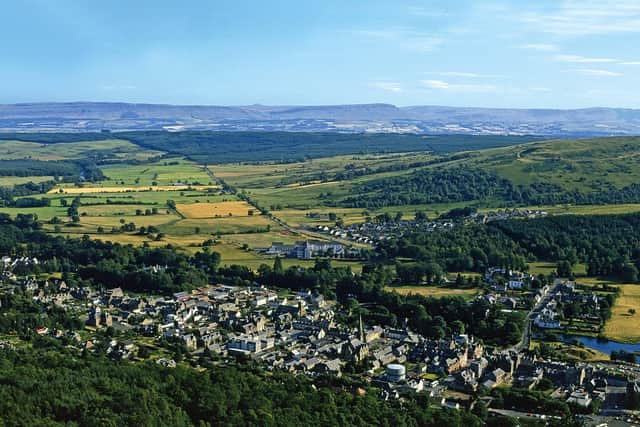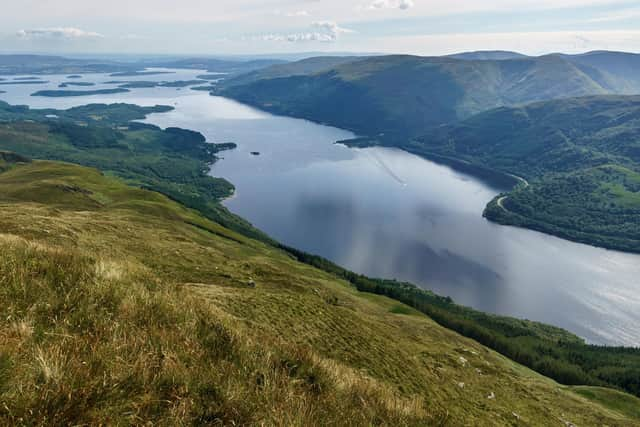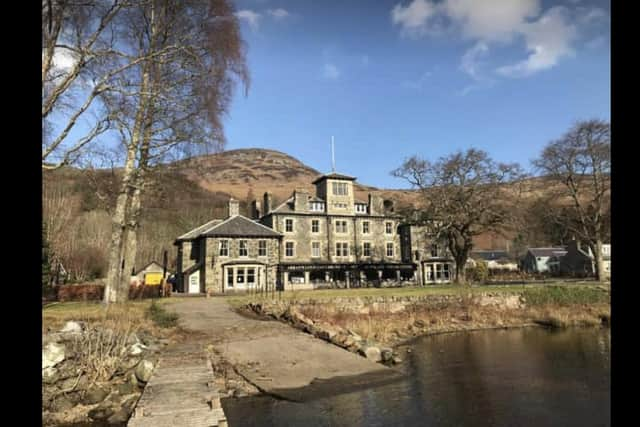Loch Lomond risks 'drift into new commuter belt' as hotels shut up shop
A number of smaller hotels have applied for permission to revert back to residential properties, with some being turned into rental accommodation as businesses struggle to offer traditional hospitality given rising costs and staff shortages.
James Fraser, of the Friends of Loch Lomond, said villages to the south of the national park, such as Callander, risked becoming ‘dormitories’ for commuters and retirees, with the vitality and economy of the areas now at risk.
Advertisement
Hide AdAdvertisement
Hide AdFraser, who is a former chief executive of the tourist board that covered the national park, Argyll and the islands, said Callander alone had lost 1,000 beds over the past 30 years, with the impact of Covid now accelerating the loss of hotels in the area once again.
He said: “In the national park, and across Scotland more generally, the small to medium family hotel is eroding and disappearing. Recent issues regarding costs and employment are accelerating the loss. Loch Lomond is a microcosm of what is happening in tourism across the country.”
He added: “It is very disappointing to see the scale of loss of family-run hotels in the national park in recent times, but this is inevitable given the major challenges and pressures faced by owners in such a difficult trading environment.
“With the loss of smaller hotels and the retrenchment of some of the larger hotel operations, some of the tourist appeal of the national park is being diluted and there is a real danger of more communities becoming dormitory commuter and retirement retreats and lacking in the diversity and vibrancy derived from having a blend of enterprises locally with employment opportunities."


Planners at Loch Lomond National Park Authority have recently received a number of applications from hotel owners wanting to change the use of their property.
The Coppice Hotel in Callander wants to revert back to being a residential property "as a result of Covid-19, increased living costs and a lack of staff".
It comes after the Waverley Hotel in Callander was given permission to convert its second floor into two five-bedroom homes of multiple occupancy to cater for demand from seasonal workers in the agriculture and tourism industries.


Meanwhile, the new owner of The Lochearn Brewery Hotel in St Filans, Perthshire, which went on the market last year for £775,000, wants to convert the 38-bedroom hotel into 22 serviced apartments for holiday use.
Advertisement
Hide AdAdvertisement
Hide AdAt the time of the sale, it was estimated the hotel needed a £1.5m investment.
Last year, the park authority approved a request to convert the Coach House Hotel at Killin, Perthshire, into a dwelling house and now the Pier Hotel in Kilmun, Argyll and Bute, is set to be turned into four flats..
Fraser said the conversion to private residential or rental accommodation was a more profitable and less demanding route for hotel owners.


The loss of the smaller hotel and guesthouse signalled a significant shift in Scottish hospitality, he said.
"One of the many appeals of coming to Scotland was staying in a guest house or hotel and meeting the owner, meeting the characters,” Fraser said. “That is changing.”
He said the park authority had to act to stop the “drift” towards the dormitory towns and villages within the national park.
Fraser added: “The park authority is currently preparing a new five-year partnership plan for the national park, which will set out key challenges and proposed actions. We fully anticipate the park authority will major on the climate and nature emergencies, but it is also vitally important that they also try and tackle the people dimension to reverse the drift towards creating more dormitory towns and villages.’’
Stuart Mearns, Director of Place at Loch Lomond & The Trossachs National Park Authority, said only a small number of accommodation businesses were planning to return “purely” to residential use.
Advertisement
Hide AdAdvertisement
Hide AdHe added: “We have not seen a significant number of hotels closing and shifting to permanent residential use. In fact, we continue to receive regular applications for new accommodation, including applications this year for hotel extensions that will create almost 200 new bedspaces.”
Mr Mearns said broader changes in the market, and a move towards self-catering accommodation, were reflected in the national park. Planning policies are in place to protect the tourism sector, he added.
Nationwide, hotels are cutting opening hours and limiting food service to counter economic challenges and staffing issues caused by the high cost of rental accommodation for workers and the impact of Brexit on the hospitality workforce.
Sandy Fraser, owner of the Oak Tree Inn in Balmaha, said: “I built the Oak Tree 25 years ago and I am the guy who persuaded my children to go into hospitality. Quite frankly, I am wondering now what I have done."
He said without significant help from the government for the industry, such as a cut in VAT, hospitality was going “to go back 40 years”.
“We will be going back to the 1990s where you couldn’t get a meal somewhere after 2pm,” he said.
The inn owner added: “I have got friends calling it a day. One sold up given an energy hike of hundreds of thousands of pounds.”
All non-domestic energy customers, including hotels, will see prices capped at at £211 per MWh for electricity, and £75 per MWh for gas for six months from October.
Advertisement
Hide AdAdvertisement
Hide AdBut Sandy Fraser said the cap was “meaningless” for the struggling hotel sector.
“You really need to be looking at VAT – we don’t need tinkering, we need a lifeline,” he said.
Despite the challenges facing hospitality, buyers are still looking for hotels, said Stuart Drysdale, a Stirling-based agent for hospitality businesses.
The impact of Covid was leading people to relocate, often from down south, and make a change in lifestyle.
Drysdale, who represents independent hospitality owners, said: "We are also seeing more interest in hotels as residential properties. This was especially true during the hot residential market of mid 2022 where residential prices were very buoyant.”
Comments
Want to join the conversation? Please or to comment on this article.
